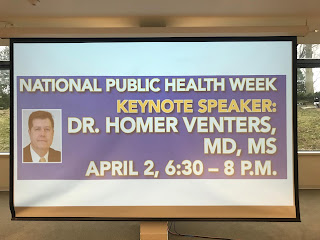National Public Health Week Keynote: Dr. Homer Venters
National Public Health Week Keynote: Dr. Homer Venters
Courtney File
Hofstra University’s
National Public Health Week allows for students and faculty to gain knowledge from
distinguished guests. This year’s keynote speaker Dr. Homer Venters, a physician,
epidemiologist and well-known leader in health and human rights issues did not
disappoint. Dr. Venters presented new, strategies which he hopes will
drastically, reduce health related problems in prisons.
His new book, Life
and Death in Rikers Island, outlines health risks in jails and prisons. Dr.
Venters stresses, “it is embarrassing how little we know about how and why
people die behind bars.”
Dr. Venters
discussed severe punishments and their impact on mental health issues. For
example, Solitary Confinement, the “practice of putting someone in a cell by
themselves for 20-23 hours per day,” is one such punishment with adverse
psychological effects. One outcome is suicidal tendencies. Dr. Venter pointed
out, “Suicide and self-harm are much more common in solitary confinement”. Therefore,
Dr. Venters became interested in creating an alternative solitary confinement
system, which requires inmates spend time in a therapeutic unit after solitary confinement.
This new system has reduced mental health issues, including suicidal
tendencies, in many inmates who leave solitary confinement.
Of interest was Dr.
Venters discussion of the differences between Nassau County jails and State
level prisons. Compared to most county jails, Nassau County has a sophisticated
system. However, at the state level the complicated issue of opioid usage
unfortunately becomes a factor. Dr. Venters stated, “lots of people who use
opioids are involved in the judicial system.”
Dr. Venters also addressed
racial issues revealing, “right now, everyone seems to be concerned with the
opioid epidemic, I think it is because more white people are dying because of
it.” Additionally, the keynote speaker discussed how there is “great racial
disparity” in how solitary confinement is used on inmates.
With
12 million incarcerations a year, the unfortunate facts remain, many inmates
will return. When comparing in-prison health care systems around the world, the
United States’ system is deficient. Most jails across the United States, and in
New York are not as sophisticated as Nassau County. One problem in the United
States is our paper filing system. This antiquated system is still in use for
medical records. This creates a greater margin of error. Most European
countries have electronic medical records in place already.
Obviously,
the United States is struggling with health care issues in general, however in
prisons health care is historically not valued. As we look to the future,
hopefully Dr. Venters mandatory therapeutic unit will become more widely used
for issues in addition to solitary confinement. If mental health is at the
forefront of incarcerations, hopefully there will be a decline in the number of
inmates returning as well as a decline in deaths.





Comments
Post a Comment